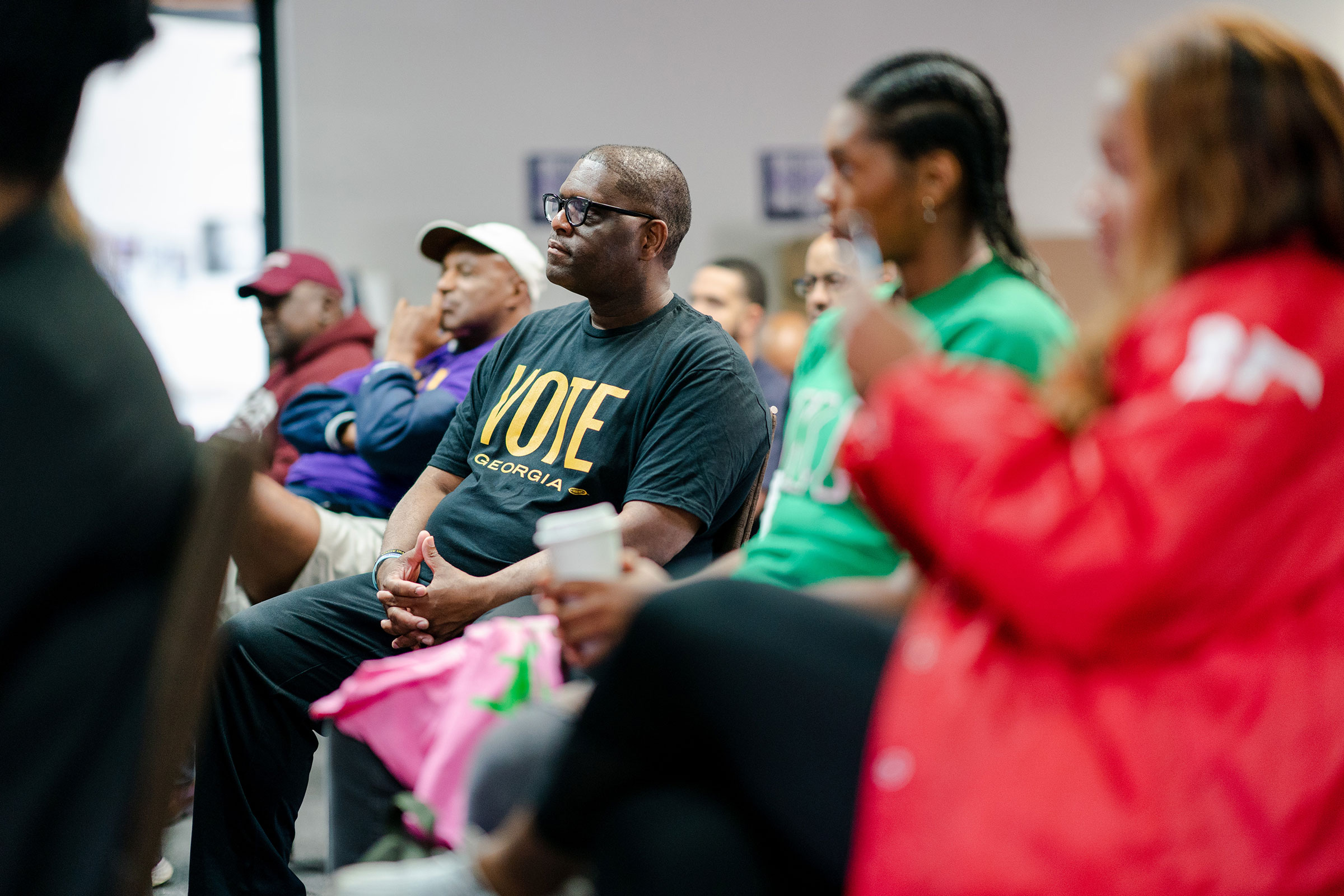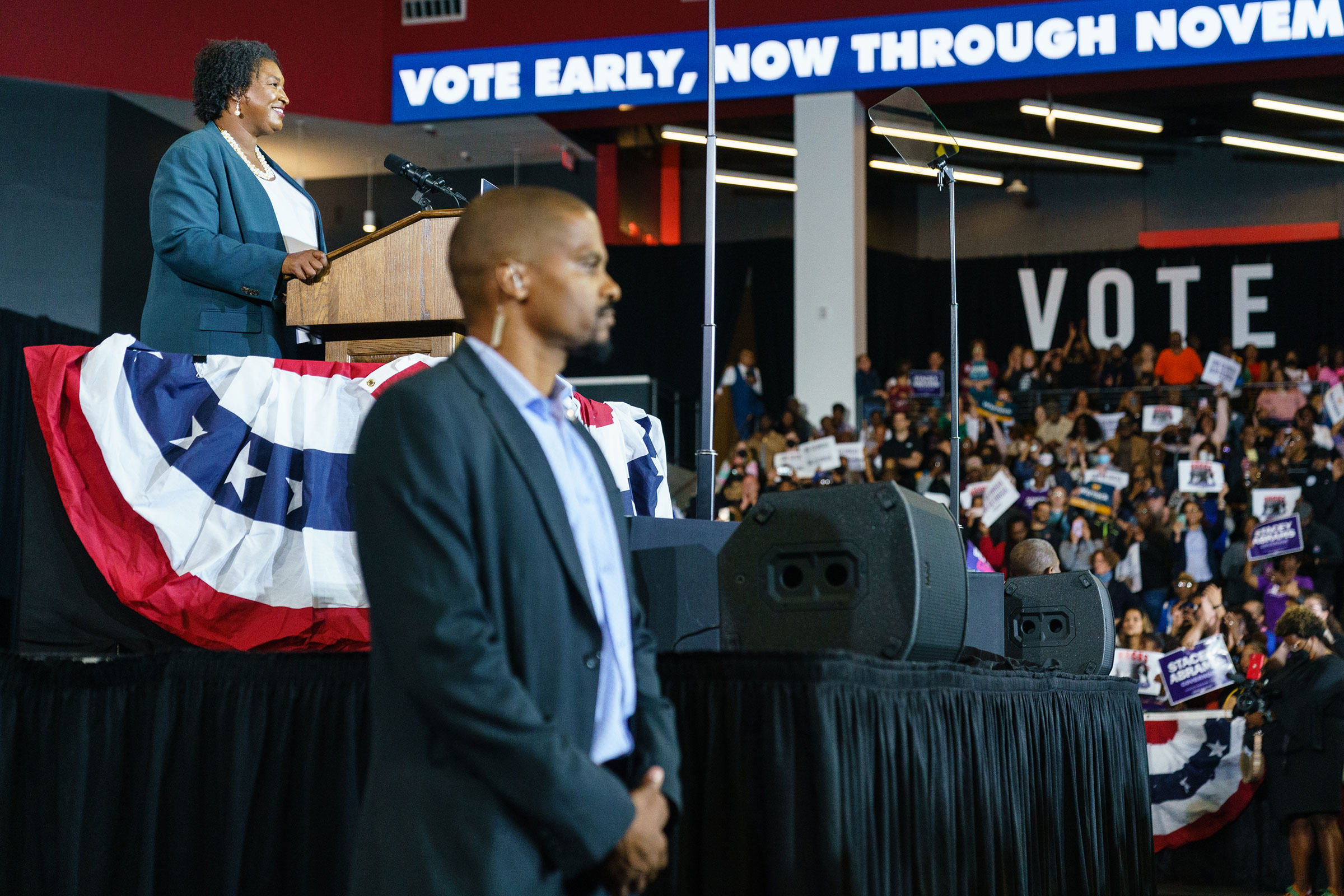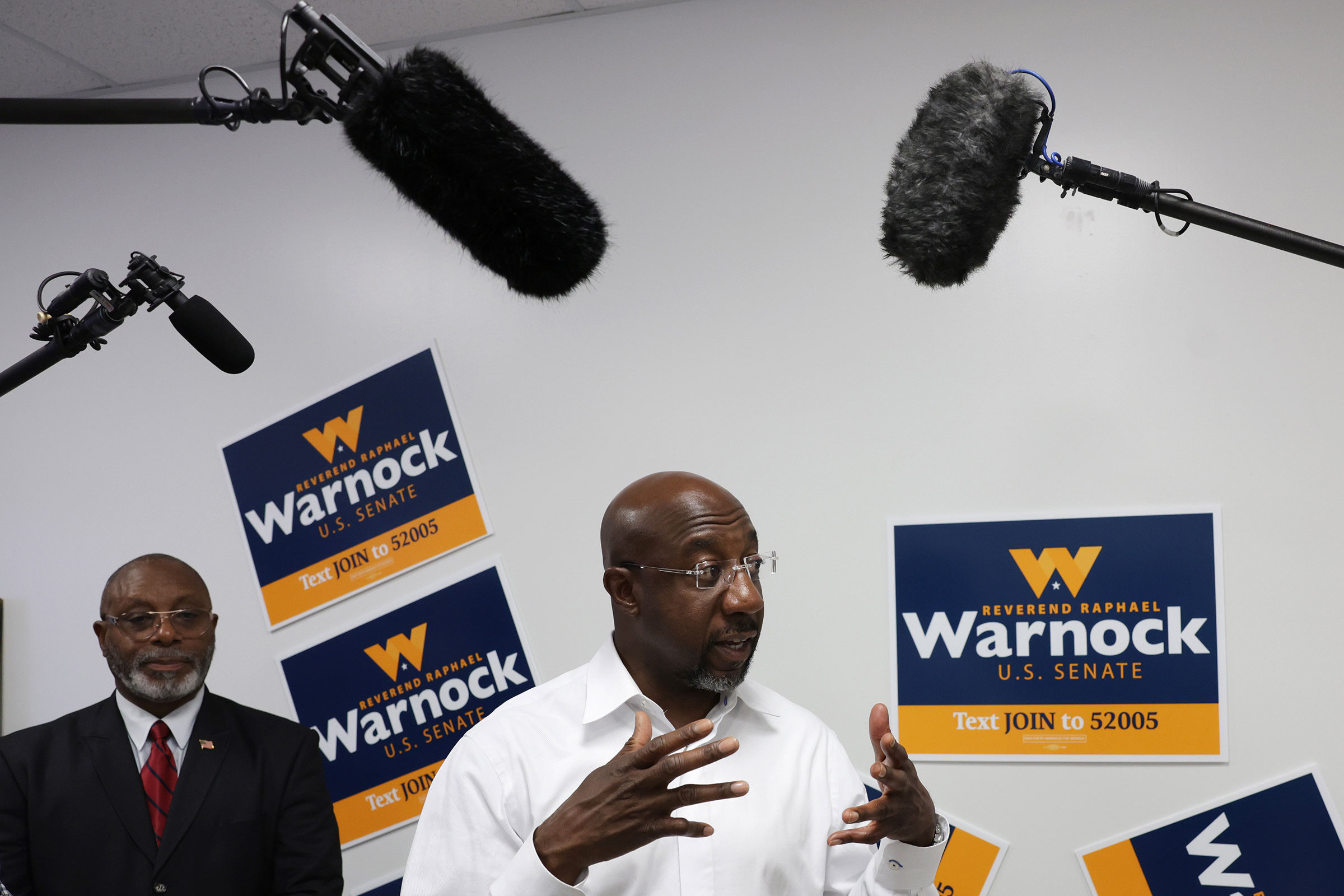
Two days before Election Day, more than three dozen Black men and boys gathered in Jonesboro, GA to share what they would say if they were sitting across from the state’s next governor.
“I would want to ask our politicians, ‘What specifically is your Black agenda for Black folk?’” one said. “Not a trickle down, where you do something for everyone, no. ‘What specifically for Black men and Black folk do you have?’”
The issues the men raised ran the gamut from low wages to education concerns, worries about their children’s health and safety, and quiet quitting. But for most of the men assembled that day, one persistent theme emerged: whether Georgia’s next leader—whether that ends up being Democrat Stacey Abrams or Republican Brian Kemp—will maintain a focus on the state’s Black residents.
“I would ask them, ‘Outside of the election period, are you committed to us?’” asked another attendee. ‘Are you committed to Black and brown people and helping us advance and progress in property ownership, voting rights, and anything to give us equal footing to make us equal to our counterparts?’” The other men clapped.
Black voters have emerged as a powerful force in Georgia politics—in 2020, they flipped Georgia blue for President Joe Biden, then proved a crucial voting bloc to elect the state’s two new Democratic Senators, whose wins secured control of Congress for the Democratic Party. It was a celebratory moment for Georgia Democrats and the state’s Black community. But two years later, many Black voters are more ambivalent about their vote, as was clear during the discussion hosted by the Black Man Lab, which provides space for Black men and boys to talk about their feelings and learn from one another.
Democrats Abrams and Senator Raphael Warnock will need strong support from Black Georgians to win on Tuesday. This year, Black voters are again turning out in large numbers—but not because they’re especially pleased with Democrats. Some polling suggests that Democrats are losing support with this group. In 2018, for instance, exit polls and AP VoteCast found that more than 93% of voters backed Abrams, compared to 83% in a polling average from early October, according to the Washington Post.
By the Georgia secretary of state’s count, early turnout for the midterms has shattered the state’s previous record. By Saturday, after in-person early voting had ended, more than 2.5 million Georgians had cast their votes at polling places or returned their absentee ballots. Multiple outlets have reported that the share of early voters who are Black has increased compared to 2020. “We were able to make a loud sound in the past election, so we are certainly looking to make a very loud sound in this election,” says Tocarro Combs, a member of the Clayton County NAACP’s executive leadership team.
Read More: Millions of Georgians Have Voted. It Hasn’t Been Easy for Everyone
Polls in Georgia continue to show Black voters overwhelmingly support Democrats. But at the Black Man Lab’s gathering in Clayton County—where nearly three out of four residents are Black, one of the highest shares of any county in America—most attendees weren’t particularly effusive about any candidate or political party. (The Black Man Lab’s tour has been conducted in partnership with the New Georgia Project, a civic engagement group that Abrams founded about a decade ago. Abrams hasn’t been involved with the group in five years, according to CEO Kendra Cotton.)
“People try to enchant our community with beautiful words,” says Glenn Gilkey, a self-employed natural hair tools inventor who attended the Clayton Country event and said he doesn’t identify with either party. “What change have we seen? We’re talking about the same issues we talked about 50 years ago.”

High opportunity voters
In 2020, grassroots groups like the New Georgia Project worked to boost turnout among Black voters and other voters of color which helped ferry Democrats to power. They’re trying to do the same this year, but they say there isn’t enough money coming in: facing a $2 million budget shortfall, Cotton said the New Georgia Project scrapped several initiatives to focus on canvassing.
“We have a formal party apparatus who seems to have decided that they no longer have the stomach for what is the intensive organizing that has to take place 365, 24/7,” Cotton says. But she concedes that Black voters are becoming weary of the constant election cycles: “There has been some voter fatigue.”
Instead of courting the high-propensity voters that tend to appear on campaigns’ lists, organizers are trying to find what they call “high-opportunity” voters where they already are, at civic events, farmers markets, or outdoor concerts. These are the voters who politicians traditionally deem “low propensity” because they vote only sporadically or without clear party preferences.
But LaTosha Brown, who co-founded the voting rights group Black Voters Matter, says low enthusiasm doesn’t necessarily equate to low turnout. “I’m a super voter, and I’ve voted and not been excited,” Brown says. “Do you know how many elections Black folks ain’t been excited in, had not a single candidate we were excited about, that we voted?”
Organizers including the New Georgia Project are encouraging Black voters to cast ballots early this year to remedy potential issues with registration and avoid an expected rise in voter intimidation at the polls. Ranard Wagner, a 36-year-old who lives in Atlanta, is one resident who voted early. He doesn’t identify with a political party and says he has “no feeling” about this election. He voted for Biden in the general election in 2020 after supporting Tulsi Gabbard in the Democratic primary. Now, he says, she “got hit in the head,” the same words he uses to describe Georgia Republican Senate candidate Herschel Walker.
Towards the end of Georgia’s early voting period, Wagner cast his ballot for Warnock. But when he was walking to the polls, “Two guys in a pickup truck get out [of] the car and ask me, am I legally registered to vote? And I looked at them and I say, ‘Get away from me,’” Wagner recalls. “I went inside the polling center and I said, ‘There’s two guys out there with tactical gear on,’… and [a poll worker] was like, ‘Oh my god, they’re back out there again?’”

‘There’s more work to be done’
Some Black voters in Georgia feel they have been shortchanged on policy decisions by leaders they helped elect.
Taifa Smith Butler, president of the progressive think tank Demos Action, lived in Georgia for years. She thinks Democrats could have done more to earn the support of voters of color and blames corporate lobbying interests for forcing Democrats to pare down the Build Back Better bill and turn it into the Inflation Reduction Act, which passed without provisions Biden had promised on the campaign trail, including federal paid family and medical leave, funding for universal pre-K, and subsidized child care. “Black and brown communities certainly were advocating for elements around climate and the environmental pieces in that legislation,” Butler says. “But there’s so much more that was on the cutting floor, in terms of the Inflation Reduction Act, around childcare, health care opportunities.”
Some Black Democrats also see flaws in the party’s framing of economic issues, which consistently rank as voters’ top concern: instead of talking about underemployment and the state’s low minimum wage, some think the party is too focused on inflation, which polls suggest is an issue that may give Republicans an edge. “People do feel forgotten after the election cycle,” Butler continues. “There’s more work to be done for the Democrats. I think there’s more work to be done, certainly, for the Republican Party.”
The same day the group of Black men met in Clayton County, Herschel Walker held a rally an hour northeast in Hiram. Though the crowd was largely white, there were a handful of Black attendees. The two Black voters who spoke to TIME were not recent converts to the Republican Party; they had cast ballots for Trump in 2016. Walker is “going to be better than Warnock, because Warnock has not done anything for Georgia,” says Dorothy Harpe, a 72-year-old woman who has been a Republican since the Reagan era and has followed Walker’s football career for just as long.
Amid the intense focus on the Black electorate in Georgia, progressive Black voters are wary of shouldering the blame if Warnock or Abrams lose to Republicans next week. “Do white people not lose elections?” says Brown of Black Voters Matter. “When white people lose elections, or Republicans lose elections, it doesn’t become a whole indictment on who they are as a people.”
More Must-Reads from TIME
- Why Biden Dropped Out
- Ukraine’s Plan to Survive Trump
- The Rise of a New Kind of Parenting Guru
- The Chaos and Commotion of the RNC in Photos
- Why We All Have a Stake in Twisters’ Success
- 8 Eating Habits That Actually Improve Your Sleep
- Welcome to the Noah Lyles Olympics
- Get Our Paris Olympics Newsletter in Your Inbox
Write to Mini Racker/Jonesboro, GA at mini.racker@time.com